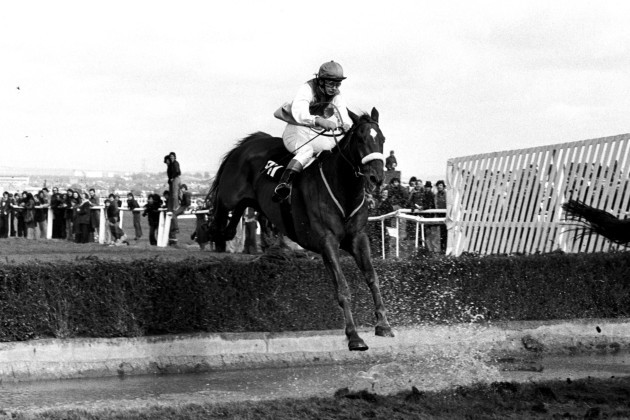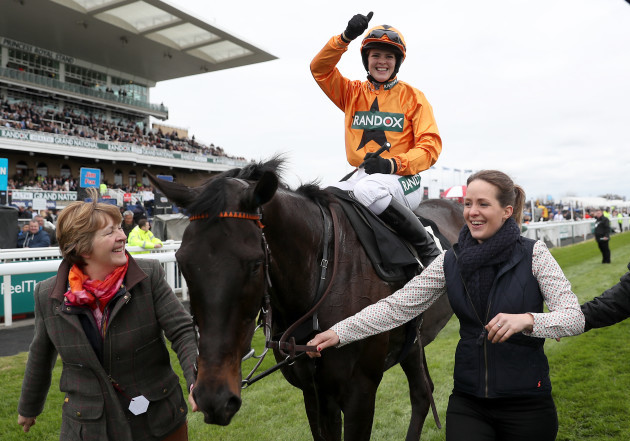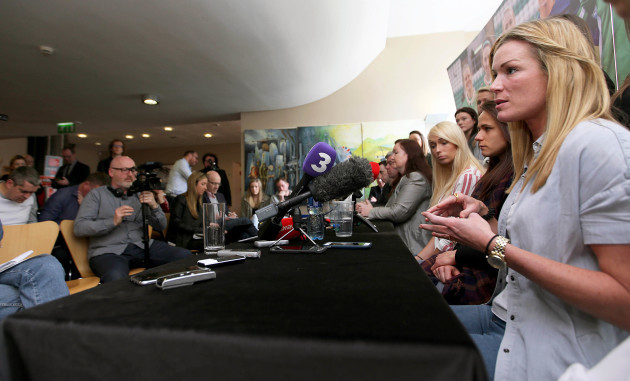AINTREE IS ALL about anniversaries in 2017: 50 years since Foinavon won after emerging from the chaos at the fence that now bears his name; 20 years since an IRA bomb scare caused the postponement of the great race; and 40 years since Red Rum won his historic third Grand National.
1977 marked another milestone that tends to be neglected due to the reverence afforded the National’s most famous former winner. In the build-up to that year’s race, much of the public attention was focused not towards Red Rum, but rather in the direction of 21-year-old Charlotte Brew, who, on Barony Fort, became the first female jockey to ride in the Grand National.
The novelty of Brew’s presence in the race was only added to by the colourful, National Velvet-tones of her back story. Barony Fort was a gift from her parents for her 18th birthday, and a surprise fourth-place finish as an amateur jockey in the 1976 Foxhunters’ Chase earned her place in the National.
While she attracted the media glare and plenty of public support, Brew’s presence in the race wasn’t universally welcomed. Ginger McCain, Red Rum’s legendary trainer, viewed the National as no place for a woman, while some other trainers and jockeys were also less than enthusiastic. Brew later told about a favourite letter she received from the women of the BBC typing pool, who refused to type for commentator Julian Wilson until he retracted some unsavoury comments about the jockey.
Barony Fort pulled up four fences from home; Red Rum raced into immortality, and Brew faded into obscurity. Forty years later the National awaits a first female winner, with Katie Walsh, third on Seabass in 2012, coming closest. All the same, the likes of Walsh, Nina Carberry and Lizzie Kelly, a Grade One winner on Thursday, show that McCain’s claim that “horses do not win Nationals ridden by women” will surely not remain true forever.
Four decades on from Aintree’s female pioneer, how incredible that another week has passed with women in sport still facing a proverbial Becher’s Brook when it comes to equality?
Where to start. Although they have garnered plenty of attention, it is barely worth regurgitating veteran BBC golf commentator Peter Alliss’s comments about the modern prevalence of “macho women,” and how he doesn’t care for them very much. To describe Alliss as a dinosaur would be to insult the contemporary relevance of Tyrannosaurus Rex culture.
Meanwhile David Moyes’s creepy warning to BBC reporter Vicki Sparks has been fleshed out to ascertain its true degree of sexist content. Some have reasoned that Moyes suggesting Sparks ‘might get a slap even though you’re a woman’ was actually not sexist at all, that in threatening a wallop without regard for the recipient’s gender, Moyes was in reality striking a great blow for equality, laying the ground for future generations of women to be bullied by foul-tempered football managers.
But while Alliss is a fossil and Moyes behaved like an arsehole, the Republic of Ireland women’s team took on a more serious enemy in their bid to have the FAI address a number of long-running grievances.
Although they were portrayed as the bad guys this week, it is not true to characterise the FAI as some sort of bastion of institutional misogyny. They do plenty of good work in the cause of diversity in general and in the promotion of the women’s game at all levels specifically.
It became clear that the main bone of contention was the desire of the women’s team to use the PFAI as their representatives, with the FAI, like many a bossman before them, unwilling to let a union get its feet under the negotiating table. Their resoluteness on this point clearly blinded them to the PR disaster that would follow the team going public on the more humiliating privations they had endured.
Still, sending an email that threatened collateral damage to the players’ club careers, international reputations and “women’s football and its future development” smacked of an attempt to bully a weaker rival, something they would never have dreamed of doing to the powerful men’s equivalent.
They messed with the wrong bunch.
Thankfully the FAI came to its senses, realising that whatever beef they had with the PFAI was not worth the appallingly inequitable fallout the women’s team were putting up with.
The existence of basic, fundamental unfairness within certain sporting codes is a bigger problem for women than the prehistoric views of some grumpy old codgers. Getting access to the facilities and supports they need to succeed is worth more to women in sport than an apology from an oafish football manager.
Ginger McCain didn’t believe women should be jockeys, but he couldn’t stop Charlotte Brew getting up on Barony Fort and riding in the National. The Ireland women’s team just wanted to get themselves to the starting line, but they’ve already jumped some pretty big fences.
The42 is on Instagram! Tap the button below on your phone to follow us!



